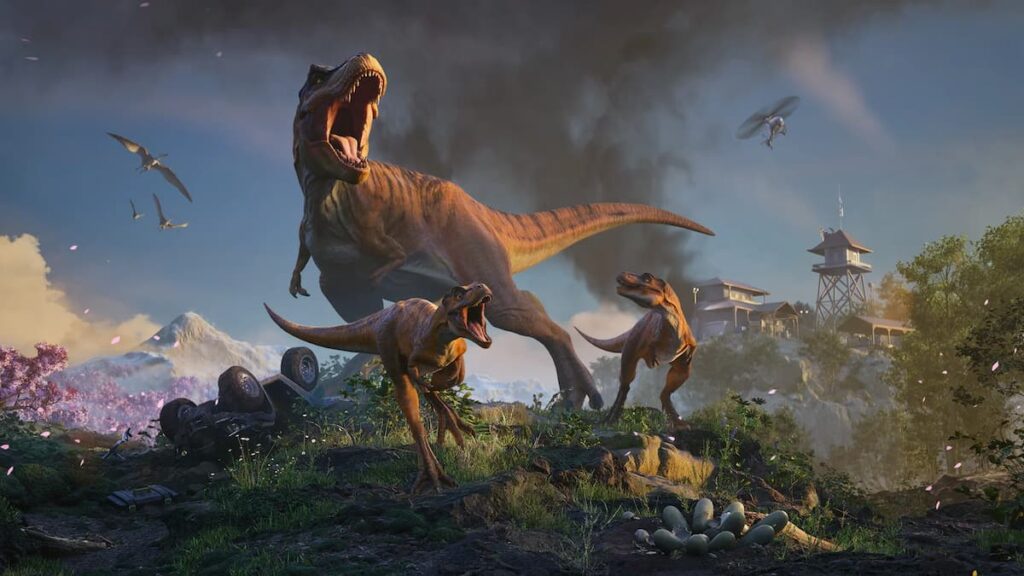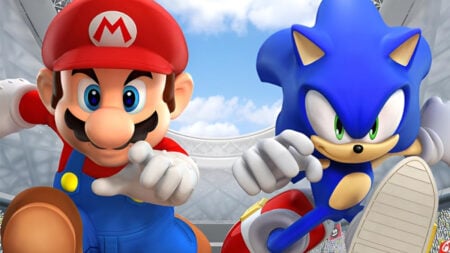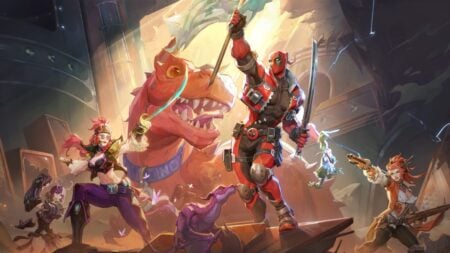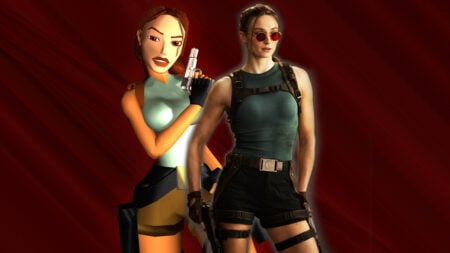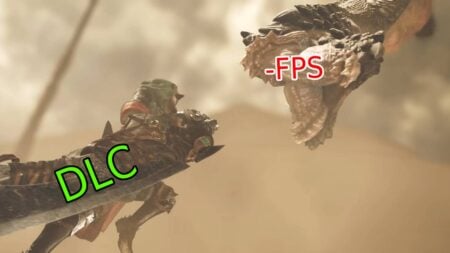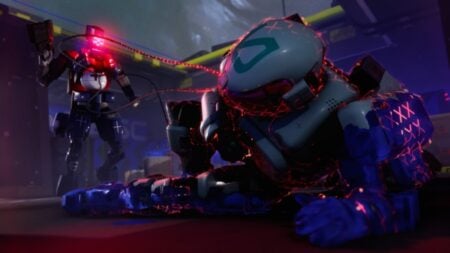Late last month, I had the chance to visit Frontier Developments’ London preview event for Jurassic World Evolution 3, held at the former site of the Museum of London. This wasn’t your typical press session: upon arrival, attendees were ushered through a staged tour of the facility by actors fully in character, from secretaries and doctors to park rangers. Each room offered a glimpse into the game’s world, culminating in a surprisingly touching encounter with a baby dinosaur.
After the tour, we sat down to play through the opening tutorial of the campaign before I stepped aside to speak with Ian Bousher, the game’s Lead Narrative Designer, and James Stant, Dialogue Manager at Frontier. We discussed everything from the newly introduced breeding system to dynamic social behavior, player freedom, and how the team is blending creative simulation with the wonder and moral complexity that define the Jurassic Park franchise.
Editor’s note: This interview transcript has been lightly edited for clarity.
Alex: Dinosaur breeding is a huge new feature of the game. How deep does it go? Will breeding mostly be about visuals like skins and dimorphism, or will it have long-term gameplay effects on park management?
James Stant: It’s more than just the skins and cosmetics –although that’s a big part of it– and those can be passed down from generation to generation. If you’re breeding dinosaurs, then you’ll be looking at their different traits, especially behavioral ones. If you’ve got something that’s particularly aggressive, you might not want to breed that down through the generations. It adds new layers of challenge and thought process to how you manage your park.

Ian Bousher: Juveniles often have different needs than their parents. You can’t expect a baby to reach the same tall leaves as an adult, for example. There are new behaviors and interactions, and it does change how you create habitats.
Alex: With new social dynamics like male T-Rexes not tolerating each other, how complex is the social simulation across different species?
James Stant: It’s something our design team has worked hard on. We looked to add those elements of dynamism so that each species feels unique to managing different species. The T-Rex is a great example, but you’ll also see that with marine species like the Megalodon, and maybe some of those marine species, they can be particularly aggressive toward one another. So when implementing a breeding program, you have to think about whether these species can cohabit peacefully.
Ian Bousher: Exactly. It’s great seeing behaviors play out dynamically because you can’t always predict how these species will interact with each other. There are these lovely moments where, say, a baby triceratops, and, what did we say it was… ?
James Stant: Yeah, it’s quite often the Lokiceratops and Triceratops. Yeah, also, beyond the moments where things don’t go so well, there are also beautiful ones… parent and juvenile interactions, or juveniles socializing with one another. As we’ve often seen in our games, those moments between adults and their young are really special and heartwarming. We want to capture that awe and wonder. Juveniles give us a fantastic opportunity to do that, and we’re really excited to bring them to Jurassic World Evolution 3.
Ian Bousher: It changes how you see the dinosaurs. The addition of juveniles and family groups gives the park a real sense of life. They’re not just assets, they’re animals with lives.
James Stant: Exactly. In the campaign, the first time you breed dinosaurs –when you’re in Hawaii with the Maiasaura– you start to build an attachment to the juvenile. We hope players will make those same attachments as their dinosaurs grow to adulthood.
Alex: In Evolution 2, some players wanted more variety in dinosaur behavior. How do juveniles and breeding affect the day-to-day life of the enclosures?
Ian Bousher: It ties into what we’ve been discussing: the interactions between species and the new dynamics at play. Some adults treat juveniles differently, and there are archetypes that govern that behavior. Juveniles also have unique paleo needs, so you’ll be observing and managing those differences as they grow.
Alex: You’re adding resizable props, recolorable buildings, natural rock fences, and waterfalls. How close does this bring Jurassic World Evolution 3 to the level of creative freedom seen in Planet Zoo or Planet Coaster?
James Stant: Absolutely. At Frontier, we’re very proud of our history with creative management games. We’ve taken a lot of learnings from Planet Coaster and Planet Zoo. It gives players a breath of tools to really realize their vision for a park. We’ve already seen incredible creations during internal testing, and we can’t wait to see what players come up with when the game launches. We’ve given players the tools, and we’re delighted to see what comes of it.

Ian Bousher: I’m terrible at building things myself, but our QA team is amazing. They’ve been testing with the new contextual menu and environmental tools, and they’re able to create parks that are stunningly detailed. The tools really make it easy to produce something beautiful; it’s bigger than the sum of its parts. It’s an amazing toolkit.
Alex: How do the different biomes affect gameplay? Do they go beyond cosmetic differences?
James Stant: Calamities have always been a big part of our games. I think it’s a core element of any Jurassic Park experience. Different biomes introduce new storm types that can impact vehicles, operations, and visibility in different ways. It builds on what we started in Evolution 2, and we’ve built on that this time around.
Ian Bousher: Separate from biomes, we’ve also revamped how we handle ratings. Each location now has a different set of metrics that reflect visitor expectations. Combined with natural variations in weather, it creates a wide range of playstyles and keeps the campaign feeling diverse.
Alex: Within the campaign, is there player choice that shapes the story, such as siding with different factions?
James Stant: We certainly give players a free-form approach to how they tackle the new levels that get unlocked in the campaign. As you travel from North America to East Asia to Europe, you can choose which parks to manage and the order to do them in.
Ian Bousher: You can’t side with different factions so much, but you can lean toward entertainment, conservation, or security. It’s more about juggling those different goals rather than picking one side.
James Stant: But that reputation with those sectors affects overall progression. We want players to have freedom in how they realize their parks, but we want to still plant those moments of drama (like sabotage) so we can craft an experience that makes players feel engaged. But not something that leads you down too much of a narrow path when you as the player want to make a park feel like it’s yours.
Alex: How central is sabotage to the campaign story?
James Stant: It’s definitely a big part. That’s going to be something we look forward to seeing how players react to it. Players can have a lot of different moral perspectives on the breeding of dinosaurs, so I suspect that Ian Malcom’s wise words will be quoted here and there.
Ian Bousher: Yes, it definitely plays a big part in the campaign. Jurassic Park has always explored ethical gray areas: the ethics of breeding them. This is the first time we’ve introduced a clear antagonist to help the player reflect on those themes. It feels authentically Jurassic. I can’t wait to see players react.
James Stant: Absolutely. It’s not that each sector sabotages the others: the player is still managing the park with Dr. Ian Malcolm’s guidance as they seek his testimony. You’ll need endorsements from returning characters like Isaac Clement, Kajal Dua, and George Lambert to make sure that DIN –the Dinosaur Integration Network– is a viable endeavour — an organization helping dinosaurs and humans coexist.
Alex: The new security camera system sounds intriguing. How does it expand on previous management tools like fences and alerts?
James Stant: Security cameras are a great new addition for management. With automated patrols, you can delegate responsibilities while staying in control. Having an ACU helicopter automatically respond to an escaped dinosaur is a huge relief. There’s a huge satisfaction of thinking, “the guys have got it because I set that up.” It means your hard work doesn’t fall apart because you missed one detail.

Ian Bousher: And when things go wrong, they tend to snowball… especially in a storm! The camera system makes recovery easier. Plus, there’s a lovely aesthetic touch to those CRT-style monitors. It really adds an aesthetic atmosphere to the experience.
Alex: With all these new systems, how do you ensure players don’t feel overwhelmed?
James Stant: Automation helps a lot. Patrols can handle veterinary needs, security, and containment, while ranger teams take care of welfare checks are handled, feeders are topped up, and things like that. We want players to feel empowered, but they’re not devoid of any control.
Ian Bousher: Exactly. We’ve spent a lot of time refining the tutorial so it feels “Jurassic,” but not hand-holding.
James Stant: Exactly. The tutorial has been a really important part of it, making sure it caters to both newcomers and returning players. Hopefully, regardless of your experience level it’s something you can pick up and become comfortable. So that fine line between usability and a cinematic experience is something we wanted to ensure. We wanted to make sure this isn’t a tickbox tutorial of do this, do that, but something that was part of the story we wanted to tell.
Alex: It certainly feels intuitive. As a new player, I found it easy to follow, so well done. And I totally appreciate the whimsy in the voicelines.
James Stant: Brilliant, that’s great to hear.
Ian Bousher: I’m glad you like the whimsy!
Alex: Oh, I love the whimsy. It suits the franchise perfectly.
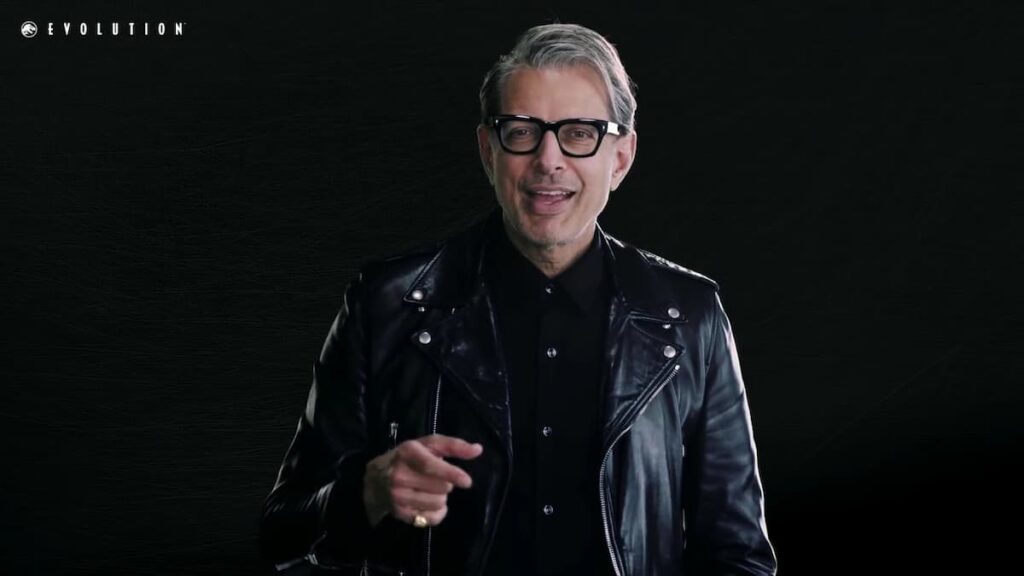
James Stant: Exactly, it does. And when you’ve got someone like Jeff Goldblum reprising his role, it’s just fantastic that we’ve been able to work closely with our partners at Universal and Jeff himself in the voice sessions to really honor the legacy of the Dr. Ian Malcom character. It’s something that is obviously really important to us, the Universal, and to Jeff Goldblum. This is a character he’s been familiar with, he’s embodied for over three decades. So it’s a real, real privilege. It’s been fantastic working with Jeff and really helping to finesse his portrayal of the character.
Ian Bousher: Jeff’s such a collaborative actor. Every line he will deliver it, and redeliver it, and reinterpret it. It’s always a discussion, and you always come out of a session with Jeff feeling so good about the work. It’s just so great.
Alex: For long-term play, how do breeding and customization keep parks feeling fresh after dozens of hours?
James Stant: With such a broad roster of prehistoric species, there’s always a sense of discovery. Breeding new species and experimenting with cosmetic traits keeps it engaging.
Ian Bousher: I’ve played the tutorial countless times, and it still feels fresh seeing a baby Maiasaura hatch. There’s something deeply rewarding about seeing families thrive.
James Stant: Yeah, the combination of animation, sound, music, and narration gives it that authentic Jurassic feel, but it also connects emotionally.
Ian Bousher: We do have mechanical depth to back that up, too: breeding stronger or more appealing dinosaurs affects your park’s success. But yes, we’re writers, so we like the majesty of it all!
———
So there you have it. From dynamic weather systems to dinosaur family trees, Jurassic World Evolution 3 is shaping up to be Frontier’s most ambitious park management game yet. The studio’s focus on emotional storytelling, refined systems, and player creativity suggests a sequel that captures both the spectacle and the soul of the Jurassic Park legacy. With breeding, juvenile dinosaurs, and a narrative that questions the ethics of creation, Frontier seems intent on reminding players that, once again, life finds a way.
Standby for The Nerd Stash’s full review of the game, publishing soon.

